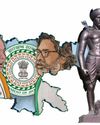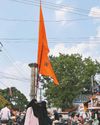Kerala’s Dalit pujari is a first in the south since Sangam era

Kerala, a pace setter in social advance since the 19th century, has registered another first by extending the principle of reservation to appointment of temple priests, and letting Dalits into the sanctum sanctorum.
Under princely rule, temples in the Travancore and Cochin regions of the state were under the control of maharajas who split the income from them with Brahmin priests and powerful families of dominant castes. All major temples of Travancore, except the Sree Padmanabhaswami temple at Thiruvananthapuram, were brought under the government by a British Resident. He had doubled up as the Dewan so as to boost the kingdom’s revenue. On accession to India, temples in both the princely states were placed under Devaswom Boards with three members, picked by the rulers, the Hindu ministers and the Hindu legislators. Later the right of the rule to nominate a board member was transferred to the Hindu ministers.
While the administrative set-up thus underwent a measure of democratisation, temple affairs remained under the rigid control of caste supremacists. The Communist Party of India (Marxist) and the Rashtriya Swayamsevak Sangh-Bharatiya Janata Party combine have been engaged in a struggle to seize the temple committees, but neither side was interested in changing their caste composition. It was through control of temples that the small Vedic community held sway over the vast Hindu populace. “The gods are under the power of mantras/ Mantras are under the control of Brahmins,” proclaims an ancient text.
Bu hikaye Outlook dergisinin October 23, 2017 sayısından alınmıştır.
Start your 7-day Magzter GOLD free trial to access thousands of curated premium stories, and 9,000+ magazines and newspapers.
Already a subscriber ? Giriş Yap
Bu hikaye Outlook dergisinin October 23, 2017 sayısından alınmıştır.
Start your 7-day Magzter GOLD free trial to access thousands of curated premium stories, and 9,000+ magazines and newspapers.
Already a subscriber? Giriş Yap

Trump's White House 'Waapsi'
Donald Trump's victory in the US presidential election may very well mean an end to democracy in the near future

IMT Ghaziabad hosted its Annual Convocation Ceremony for the Class of 2024
Shri Suresh Narayanan, Chairman Managing Director of Nestlé India Limited, congratulated and motivated graduates at IMT Ghaziabad's Convocation 2024

Identity and 'Infiltrators'
The Jharkhand Assembly election has emerged as a high-stakes political contest, with the battle for power intensifying between key players in the state.

Beyond Deadlines
Bibek Debroy could engage with even those who were not aligned with his politics or economics

Portraying Absence
Exhibits at a group art show in Kolkata examine existence in the absence

Of Rivers, Jungles and Mountains
In Adivasi poetry, everything breathes, everything is alive and nothing is inferior to humans

Hemant Versus Himanta
Himanta Biswa Sarma brings his hate bandwagon to Jharkhand to rattle Hemant Soren’s tribal identity politics

A Smouldering Wasteland
As Jharkhand goes to the polls, people living in and around Jharia coalfield have just one request for the administration—a life free from smoke, fear and danger for their children

Search for a Narrative
By demanding a separate Sarna Code for the tribals, Hemant Soren has offered the larger issue of tribal identity before the voters

The Historic Bonhomie
While the BJP Is trying to invoke the trope of Bangladeshi infiltrators”, the ground reality paints a different picture pertaining to the historical significance of Muslim-Adivasi camaraderie